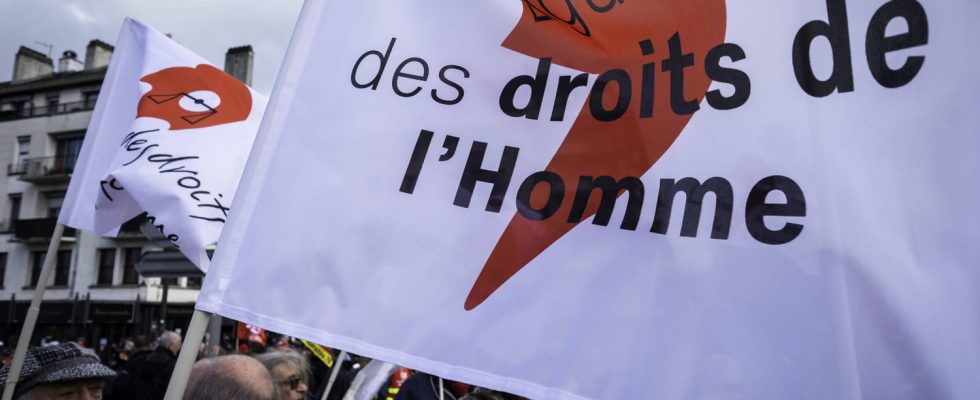Questioned in the Senate following the remarks of Gérald Darmanin, Elisabeth Borne declared that she “no longer understands certain positions” of the League of Human Rights. But do you know why the executive confronts the LDH?
The Prime Minister assumes the words of Gérald Darmanin. Questioned during questions to the government on Wednesday April 12, 2023, Elisabeth Borne defended his Minister of the Interior. After questioning the latter about the subsidies granted to the League of Human Rights, the Prime Minister declared that she has “a lot of respect for what the LDH has embodied, but I no longer understand some of its positions.” This statement comes at a time when the association is very critical of the management of law enforcement in France. The Prime Minister, however, argues that there is “no question of lowering the subsidy of such and such”. The president of the LDH, Patrick Baudouin, affirms that “never has the League of Human Rights been called into question in this way”.
As a reminder, on April 5, 2023 during a hearing before the Assembly’s law commission, Gérald Darmanin had admitted that he “does not know the subsidies given by the State” to the LDH “but that deserves be viewed in the context of the actions it may have carried out”. According to him, the association is a “funny observer”. For Elisabeth Borne, “this misunderstanding is not new, it has emerged in its ambiguities in the face of radical Islamism and it has been reinforced for a few months”. She declares that her opinion is “shared by many actors in the associative world” such as the Licra (International League against Racism and Anti-Semitism) which reported to the National Consultative Commission on Human Rights “the excesses and failures of the League for the Rights of Man”. These declarations had positive effects for the LDH: an increase in the number of members, a wave of donations following a column published on the front page ofHumanity signed by more than 1000 personalities.
What exactly is the League of Human Rights?
It is an association created in 1898 to defend Captain Alfred Dreyfus. This military officer is accused of spying for Germany against a background of anti-Semitism. Its founder is Ludovic Trarieux, at the time senator of the Gironde. After the First World War, the LDH joined forces with neighboring leagues to create the International Federation of Human Rights Leagues. The Second World War brought it to a halt because more than a third of its members disappeared. She then engaged in the anti-colonial struggle and then from the 1970s against the death penalty and for abortion. In 2022, the association had more than 8,000 members.
It wishes to “defend the principles set out in the Declarations of Human Rights of 1789, 1793, the Universal Declaration of 1948 and the European Convention on Human Rights” according to its founding statutes. She declares herself “non-partisan” and “intervenes in all areas concerning citizenship, freedoms and rights, collective or individual. She is secular.”
Why is the LDH criticized?
The League of Human Rights is increasingly targeted for its political action. Gérald Darmanin, for example, criticized the association for having “attacked the decree which prevented the transport of weapons” published by the prefect of Deux-Sèvres, Emmanuelle Dubée, on the occasion of the demonstration against the mega basin of Sainte Soline. The government is also opposed to the LDH following accusations against the security forces which allegedly prevented relief from intervening with injured demonstrators, according to the association.
Many politicians and observers criticize him for his rapprochement with the CCIF (Collective against Islamophobia in France). The LDH had defended this collective during its dissolution led by Gérald Darmanin in 2020. Charlie Hebdo lawyer Richard Malka had thus denounced the absence of the LDH during the trial after the attack committed in the premises of the satirical newspaper. According to him, “there were all the major anti-racist associations and even the MRAP (Movement against racism and friendship between peoples) for whom it was not easy, but they had the courage to be alongside the victims […] the only association that wasn’t there was the Ligue des Droits de l’Homme, created at the time of the Dreyfus Affair, and which was not alongside the victims of hyper kosher, not alongside of Charlie Hebdo, but they are at the same time on the side of the CCIF”.
Its president Patrick Baudouin told the World of her consternation after the words of Elisabeth Borne: “we hoped that Elisabeth Borne would reframe her minister in a more republican direction, and more respectful of freedom of association. Today, I am somewhat ashamed for our country, which is gradually slipping towards illiberal regimes”. Asked about the “ambiguities in the face of radical Islamism” that the LDH maintains according to the Prime Minister, the lawyer specializing in international criminal justice explains that his association defends “all the rights, even the rights of terrorists to be judged fairly. , and not by exceptional justices”. Patrick Baudouin underlines his wish “that the prosecutions be carried out in accordance with the law. This goes back to the history of the League, a struggle of one hundred and twenty-five years against injustice and arbitrariness.”
On Darmanin’s remarks concerning the state subsidies granted to the LDH, its president is indignant about France info “I would not like us to be brought back, in our country, to these countries which come to censor associations by this financial mechanism to prevent them from functioning”. Faced with these accusations, the League of Human Rights has a line of defense, namely that its fight was the defense of the rule of law against arbitrariness.
Its more than 8,000 members finance 38% of their association’s budget according to their figures by 2021. The State and local authorities represent 29% (€556,000 in 2021, including €276,000 paid by the State) and donations reach 20%. Sales during their actions bring 11% of the receipts and private funds finance 3%.
